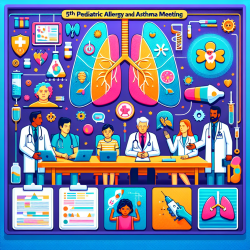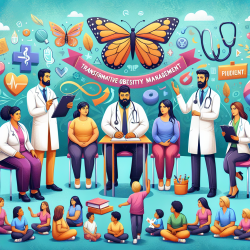In recent years, the intersection of pediatric allergy, asthma, and speech-language pathology has garnered significant attention, particularly due to the impact these conditions can have on a child's developmental outcomes. The 5th Pediatric Allergy and Asthma Meeting (PAAM) provided a comprehensive overview of current research and innovative treatments that could be pivotal for practitioners in these fields. One of the key takeaways from this meeting was the potential of oral immunotherapy (OIT) in treating cow’s milk allergy (CMA) in children, which is particularly relevant for speech-language pathologists working with this population.
Oral Immunotherapy and Cow’s Milk Allergy
Research presented at PAAM highlighted a decade-long study on the efficacy of OIT for children with persistent cow’s milk allergy. The study, which followed 108 children over ten years, demonstrated a remarkable success rate of 91.6% in achieving tolerance to cow’s milk. This finding is crucial as it underscores the potential of OIT not only in mitigating allergic reactions but also in improving overall quality of life for affected children.
The study’s methodology involved a gradual increase in cow’s milk protein intake, starting from minimal doses and progressing to a maintenance dose of 3600 mg per day. Regular monitoring through skin prick tests and blood tests for immunologic parameters provided robust data on the treatment's effectiveness and safety.
Implications for Speech-Language Pathologists
For speech-language pathologists, these findings have several implications:
- Enhanced Dietary Management: Children with severe allergies often face dietary restrictions that can impact their nutritional status and, consequently, their cognitive and speech development. OIT offers a pathway to dietary normalization, which can support better health and developmental outcomes.
- Improved Quality of Life: The reduction in allergy-related anxiety and the ability to participate in normal dietary practices can significantly enhance a child’s social and emotional well-being, which is closely linked to communication skills.
- Interdisciplinary Collaboration: The success of OIT underscores the importance of collaboration between allergists, dietitians, and speech-language pathologists. This interdisciplinary approach ensures comprehensive care that addresses both the medical and developmental needs of the child.
Encouraging Further Research
While the results from PAAM are promising, there is a need for continued research to optimize OIT protocols and ensure their safety and efficacy across diverse populations. Speech-language pathologists can play a crucial role in this research by contributing insights on how dietary interventions impact speech and language development.
Moreover, practitioners are encouraged to stay informed about emerging treatments and to advocate for their integration into clinical practice. By doing so, they can help ensure that children with allergies receive the most effective and holistic care possible.
Conclusion
The 5th Pediatric Allergy and Asthma Meeting has provided valuable insights into the management of cow’s milk allergy through oral immunotherapy. For speech-language pathologists, these findings highlight the potential benefits of OIT in improving dietary management and overall quality of life for children with severe allergies. As we move forward, continued research and interdisciplinary collaboration will be key to optimizing outcomes for these children.
To read the original research paper, please follow this link: 5th Pediatric Allergy and Asthma Meeting (PAAM).










